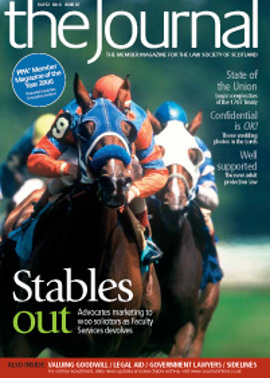Spotlight on fairness

Bail and fair trial
A person who is charged on indictment with a drug trafficking offence and who has a previous conviction for such an offence will only be granted bail in exceptional circumstances: Criminal Procedure (Scotland) Act 1995, s 23D.
There is little case law on what constitutes “exceptional circumstances”, but it is now clear from HM Advocate v CK [2011] HCJAC 61 (6 May 2011) that none exist where it is thought that, unless bail is allowed, the accused’s solicitor will not be able to prepare properly because of restrictions in legal aid fees for prison consultations, with consequent breach of the fair trial guarantee in ECHR article 6(1).
The case reached the appeal court following a Crown bail appeal against a decision by the sheriff that in order for the accused to get a fair trial, she had to be at liberty where what he initially described as the “unreasonable strictures” of the fees regime did not apply. As all criminal legal aid solicitors know, a new fees regime was introduced in 2010, providing for block fees for all meetings in prison with a client remanded in custody, after full committal up to conclusion of the case. However, the 2010 Regulations also allow for an application to the Scottish Legal Aid Board, where the solicitor considers that the case raises unusually complex issues of fact, to allow fees to be paid on the traditional “time and line” basis. That application can be made at any time until four months from the conclusion of the proceedings. SLAB has also expressed its willingness to issue a “letter of comfort” prior to trial where information becomes available that the number of prison attendances is likely to fall outwith the range which the block fee can reasonably be expected to recover, and for the matter to be finally decided on submission of the solicitor’s account at the end of the case.
All of those latter considerations, said the appeal court, were fatal to a contention at the stage of a bail application that because of the fees regime, the accused could not get a fair trial unless bail was granted. In his report to the appeal court the sheriff made clear his view that the only means by which the accused could receive a fair trial would be not to restrict the solicitor’s consultations, but the appeal court held that this view was premature, citing Buchanan v McLean 2001 SCCR 475 on the need when considering article 6 in advance of trial for a court to have all the necessary information before holding that a breach was inevitable. The Crown appeal was allowed.
Extrajudicial admissions
It is heartening to know that Chalmers v HM Advocate 1954 JC 66 is still good law. When interviewing a suspect, it is not the function of the police to direct their endeavours to obtaining a confession from him to be used as evidence against him at his trial; and in Thompson v Crowe 2000 JC 173, it was confirmed that the admissibility of answers to police questions was a matter of law to be determined by the trial judge, deciding on a balance of probability disputed issues of fact bearing on that decision. Richardson v Forrester [2011] HCJAC 71 (15 June 2011) is an example of these principles in action.
There, the accused was a chief inspector of police who had been charged with dangerous driving. The evidence disclosed that while he was a suspect he had been interviewed under caution by a detective chief superintendent at great length. The agreed transcript of the interview ran to 92 pages and the subsequent summary trial lasted seven days. At the end of it all, the sheriff sustained an objection to the admissibility of an admission by the accused towards the end of the interview, holding that the evidence of the DCS was unsatisfactory, principally due to inconsistencies as to why the interview was taking place. Ultimately, he found that the interview had been unfair, on the basis that it was designed to prompt the accused into making an admission; the latter had not been told for some time that he was a suspect in a criminal investigation, or of the allegation against him; and the interview had been oppressive in terms of repetitive questions and length. Accordingly, there was no case to answer.
All of the sheriff’s reasoning on these points was supported in the appeal court, which was also strongly critical of a Crown argument that it could be inferred from a flippant remark by the sheriff in chambers, in the presence of the depute fiscal and defence counsel, that he was biased against the police, and indeed that his decision on admissibility had displayed actual bias. The Crown appeal was refused.
OLR for breach of the peace
It must be wholly exceptional for a first offender who pleads guilty to (i) a breach of the peace and (ii) illegal possession of five cans of pepper spray, to be sentenced to an order for lifelong restriction (OLR) with a punishment part of 18 months, but this disposal was upheld on appeal (in respect only of the first charge) in Johnstone v HM Advocate [2011] HCJAC 66A (5 July 2011).
That charge involved stalking and harassment, committed by a person with mental health problems against a female clinical psychologist from whom he had been receiving treatment as an outpatient. The conduct was spread over a period exceeding two years and included the taking of over 1,000 clandestine photographs of the victim, her home and her car, following her to her home address, theft from her office and damaging her vehicle.
After hearing evidence following the making of a risk assessment order, the sentencing judge was satisfied that the crime had a very serious impact on the complainer and that on a balance of probabilities, the statutory risk criteria were met: there was a likelihood that the accused, if at liberty, would seriously endanger the lives or physical or psychological wellbeing of members of the public at large.
The appeal against the OLR proceeded first on the basis that it was incompetent because, following amendment in 2005, the relative section of the 1995 Act was ineptly drafted and failed through lack of clarity. This was rejected after detailed reference was made to the interpretative statutory instrument relating to Acts of the Scottish Parliament, and the explanatory memorandum and ministerial statement relating to the 2005 amendments. The second ground, to the effect that the sentence amounted to preventive detention and was thus contrary to ECHR article 5(1), fared no better: Strasbourg and UK case law established that preventive detention was permissible if it met certain criteria, all of which applied in the case of an OLR.
Withdrawal of guilty plea
Another case in this fraught area has recently been argued in the appeal court: McLean v HM Advocate [2011] HCJAC 67 (8 July 2011).
The appellant was the individual whose prosecution before sheriff and jury had led to the lodging of a devolution issue claiming that evidence of his police interview, conducted in the absence of legal advice, would be inadmissible on Convention grounds, a submission rejected by a full bench in the High Court, to which the sheriff had referred the matter: 2010 SCCR 59. Soon after, that decision was effectively overruled by the Supreme Court in Cadder v HM Advocate 2010 SCCR 951, which led to the passing of emergency legislation by the Scottish Parliament.
It was the chronology of all this which caused the appellant to return to the appeal court. On 21 October 2009 the full bench directed the sheriff to dismiss the devolution issue, indicating it would give full reasons later. The appellant sought leave to appeal to the Supreme Court, but that application was continued and the case was remitted to the sheriff court for trial. On 7 December when the case called before the sheriff, the devolution issue was dismissed, but instead of going to trial the appellant pleaded guilty in restricted terms to the indictment, having received legal advice about the effect of doing so. On 15 December the full bench reasons became available, with the Cadder judgment following on 25 October 2010.
What the appellant then sought to do in the High Court was to have his guilty plea (and his sentence) set aside on the basis that the Crown had acted ultra vires in raising the indictment against him and accepting his guilty plea. Neither of these points was held to have any merit. Because at the time they indicted the appellant, the Crown had a number of sources of evidence available to it quite independent of the appellant’s answers to police questions, it did not act ultra vires in serving an indictment; only if flawed evidence were used to secure a conviction would a trial be rendered unfair. But more significantly, the appellant had chosen to plead guilty after having had legal advice; under reference to Reedie v HM Advocate 2005 SCCR 407 there were no grounds for setting aside the plea.
In this issue
- Take five
- Shared concerns
- Fairness in repossession
- The price of freedom
- Next month: your new look Journal
- A tale of two cities
- Ready money
- The longest arm of the law
- Return to normality?
- Ghost of decree past
- Shaping the world order
- Bright lights
- "One Profession" comes together
- From the Brussels office
- Ask Ash
- Give it a push start
- Up to the job?
- Spotlight on fairness
- Human rights abroad
- Heightened AWaReness
- Recipe for fudge
- My late father
- Getting closure
- Website review
- Book reviews
- Clearer view
- Rules of engagement






